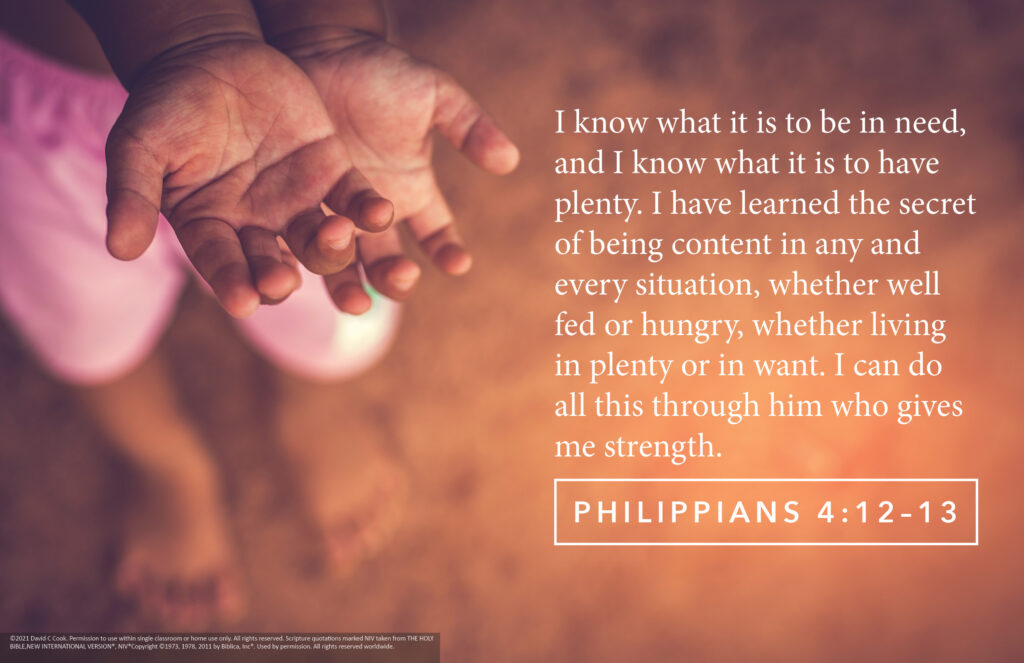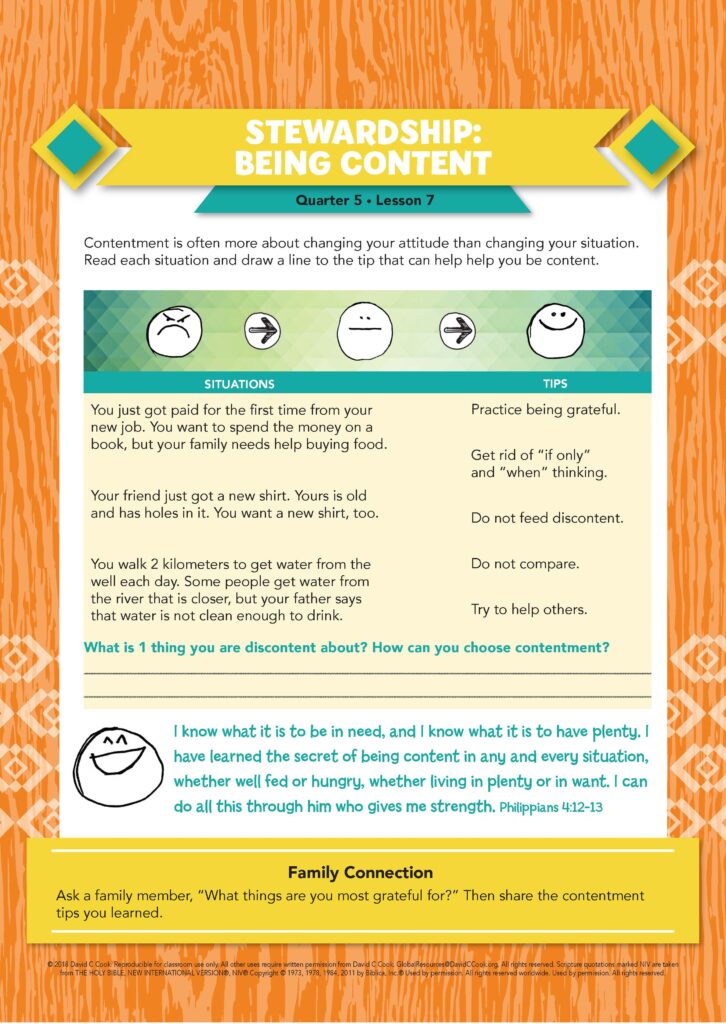During the lesson, the information for you to know is written in regular type, and what we suggest speaking or reading aloud to children is in bold. All resources for this lesson, including the Teacher Guide, Student Page, Family Connection Card, and other resources can be downloaded in a ZIP file by clicking on the following link:
In some lessons you will find "resource articles." These are articles written by experts from around the world to help equip you for your work with children and adolescents. Share them with parents or guardians if you consider it appropriate.
I know what it is to be in need, and I know what it is to have plenty. I have learned the secret of being content in any and every situation, whether well fed or hungry, whether living in plenty or in want. I can do all this through him who gives me strength.
Philippians 4:12–13
We all have needs that we spend our time and resources on. When we do not have enough to meet our needs, we have to choose what is the most important. We may feel discontent, thinking that if only that particular need was met, we would be happy. But Paul can teach us a great deal about contentment. When he was sitting in prison, he was focused on being thankful. He knew that he could trust God no matter what circumstance he found himself in.
Think of something you are discontent about. Maybe it is due to something like feeling anxious because there has been no rain to water the crops. Maybe it is due to comparing yourself with others and wanting more than you have, even though your needs are met. God uses circumstances in our lives to show us that we need Him and to help us to see what we truly value. Take your worries, fears, and discontent to God. Ask Him to forgive your discontent. Ask Him to help you trust in His provision. This is where true contentment is found!
Encourage the students to ask a family member, “What things are you most grateful for?” They can then share the contentment tips with their family members.
Teacher Tip: If possible, email or text the Family Connection Card to the families of your students.
As the students arrive, ask them to share with 2–3 others what they did to work hard this past week. Praise them for their efforts and then begin the lesson.
Have the students form groups of 4–5. They will talk about the following questions in their groups. After about 2 minutes, each group will share their answer to each question and why they made that choice.
All of these choices show us what we value most. We make decisions like this every day, and these decisions show what is most important to us.
Today we will learn more about how being content is good stewardship. Being content means you are satisfied and happy with your life.
Being content is not based on having every need and want met. It is an attitude and a choice. Often, it is something we have to learn. Being content means you are grateful for what you do have and that you trust in God for the things you do not have. It is a satisfaction inside that does not depend on your circumstances. Contentment is why some people who do not seem to have much can enjoy great peace and happiness. Contentment brings joy.
One thing that shows our level of contentment is the way we think about money. Many people think of money all the time—how to make it, how to spend it, and why they do not have more of it. They may be rich or poor. The rich may think about ways to make more, how to protect it, and how to spend it all. The poor may think about ways to use it to meet their basic needs and worrying that they do not have enough. Both may think about money all the time. This becomes their treasure or the thing they value most in life.
Listen to this Bible verse about what God says about our treasures.
Have a student read Matthew 6:19–21 aloud from the Bible. If that is not possible, the passage is printed here for you.
Do not store up for yourselves treasures on earth, where moths and vermin destroy, and where thieves break in and steal. But store up for yourselves treasures in heaven, where moths and vermin do not destroy, and where thieves do not break in and steal. For where your treasure is, there your heart will be also.
Matthew 6:19–21
The students will likely answer that earthly treasures are easily stolen or destroyed.
Guide the students to understand that treasures are things we value in life, such as our time, skills, or money. When we use these things to bring honour to God, it is as though we are giving them to Him to store up for us as treasure in heaven, which is of much greater value than earthly treasure.
Guide the students to understand that when we treasure earthly things, we are making these things our priority. But when we use our “treasures” to honour God, we are showing that God, not our treasures, is the priority.
But if we have food and clothing, we will be content with that. Those who want to get rich fall into temptation and a trap and into many foolish and harmful desires that plunge people into ruin and destruction. For the love of money is a root of all kinds of evil. Some people, eager for money, have wandered from the faith and pierced themselves with many griefs.
1 Timothy 6:8–10
Another problem caused by the love of money is a lack of contentment. No matter how much money you have, it is likely that you will always feel you need more. Even very rich people often think they do not have enough, so making money can become more important even than spending it. Listen to this verse about contentment.
Keep your lives free from the love of money and be content with what you have, because God has said, “Never will I leave you; never will I forsake you.”
Hebrews 13:5
Guide students to see that being content is tied to God’s presence in our lives, not to having or lacking money.
Finally, loving money too much can cause you to go into debt. Being in debt is not good stewardship. Listen to what God teaches us about being in debt.
The rich rule over the poor, and the borrower is slave to the lender.
Proverbs 22:7
It is not good to go into debt for things that are wants rather than needs. For example, someone wants a better home or a car and chooses to go into debt. That is not wise. Sometimes you cannot help going into debt. For example, a family may have a medical emergency and owe the clinic a large sum of money. If you are faced with a situation that results in debt, do what you can to pay that debt off as quickly as possible. Even when you are in this circumstance, God can help you have contentment! Listen to what the Bible says about contentment.
If you are using the Memory Verse Poster, show it to the students.

I know what it is to be in need, and I know what it is to have plenty. I have learned the secret of being content in any and every situation, whether well fed or hungry, whether living in plenty or in want. I can do all this through him who gives me strength.
Philippians 4:12–13
Allow 2–3 students to share their ideas.
Here are some more tips to help you learn to be content no matter what your circumstances are:
Remember that contentment does not depend on your circumstances. The things we learned about focusing on money to make us content are not true only for money. They are true for anything we allow to have too much importance in our lives.
Let’s think about the things that keep us from being content now. Answer the following questions quietly to yourself. Your answers may be physical things, such as money or possessions. But they may also be emotional needs or even a negative thing that has become too important in your life, such as pornography.
Being content even when you do not have enough is always hard. But God can help us to have contentment. Listen to what the Bible says about God’s help for those in need.
But as for me, I am poor and needy; may the Lord think of me. You are my help and my deliverer; you are my God, do not delay.
Psalm 40:17
Divide the students into groups of 3. Girls should be with girls and boys with boys. They will share situations in their own lives where they are not content. They can share smaller issues, such as wanting new shoes, or larger issues, such as wanting better friends or more food to eat. The students can then encourage each other with ways to be content. Then they can pray for each other.
Optional: If you are using the Student Page, give the students time to complete it.

Close your time with a blessing over your students based on Philippians 4:12–13:
Blessing: May you know how to be content in every circumstance. May you know that God cares for your needs.
Lead the students in singing this quarter’s song, if possible.
Life on Life ©2020 David C Cook. Reproducible for home or classroom use only. All other uses require written permission from David C Cook [email protected]. All rights reserved.